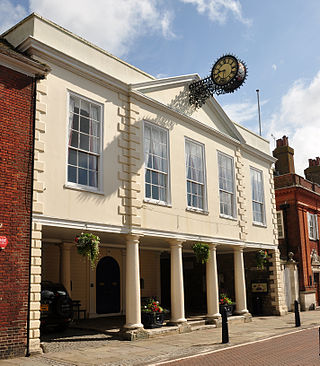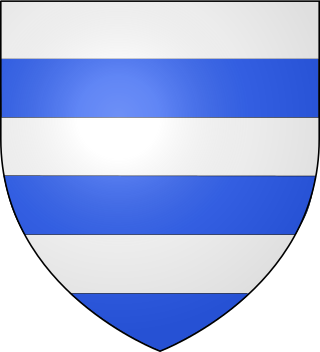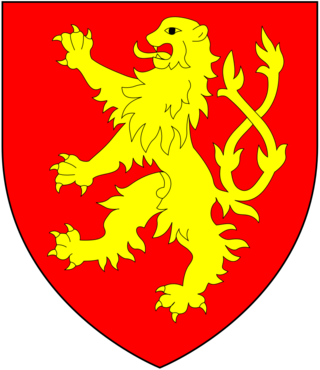
The confederation of Cinque Ports is a historic group of coastal towns in south-east England – predominantly in Kent and Sussex, with one outlier (Brightlingsea) in Essex. The name is Old French, meaning "five harbours", and alludes to the original five members. At its peak in the Late Middle Ages, the confederation included over 40 members. There are now a total of 14 members: five "head ports", two "ancient towns" and seven "limbs".

Hythe is a market town and civil parish on the edge of Romney Marsh, in the district of Folkestone and Hythe in Kent, England. The word Hythe or Hithe is an Old English word meaning haven or landing place.

Thomas Brassey, 1st Earl Brassey, was a British Liberal Party politician, governor of the Colony of Victoria and founder of The Naval Annual.

The Lord Warden of the Cinque Ports is a ceremonial official in the United Kingdom. The post dates from at least the 12th century, when the title was Keeper of the Coast, but may be older. The Lord Warden was originally in charge of the Cinque Ports, a group of five port towns on the southeast coast of England that was formed to collectively supply ships for The Crown in the absence at the time of a formal navy. Today the role is a sinecure and an honorary title, and fourteen towns belong to the Cinque Ports confederation. The title is one of the higher honours bestowed by the Sovereign; it has often been held by members of the Royal Family or prime ministers, especially those who have been influential in defending Britain at times of war.
Hamo de Crevequer was an Anglo-Norman nobleman who held the office of Lord Warden of the Cinque Ports.

Stephen de Pencester was Warden of the Cinque Ports when the first authoritative list of Cinque Ports Confederation Members was produced in 1293.

Richard de Grey of Codnor, Derbyshire, was a landowner who held many important positions during the reign of Henry III of England, including Warden of the Isles 1226–1227, 1229–1230 and 1252–1254, and later both Constable of Dover Castle and Warden of the Cinque Ports from 1258 irregularly to 1264.

Henry de Cobham, 1st Baron Cobham lord of the manor of Cobham, Kent and of Cooling, also in Kent, was an English peer.

Sir Thomas Cheney KG of the Blackfriars, City of London and Shurland, Isle of Sheppey, Kent, was an English administrator and diplomat, Lord Warden of the Cinque Ports in south-east England from 1536 until his death.
Andrew de Guldeford was Lord Warden of the Cinque Ports at some time between 1364 and 1376, probably from 1371 to 1372.
Sir Henry de Sandwich was Lord Warden of the Cinque Ports during the 13th century.

Robert de Burghersh, 1st Baron Burghersh, was born between 1252 and 1256, at Burghersh, in Sussex, England, and died in 1306.
Walerand Teutonicus was a Lord Warden of the Cinque Ports during the thirteenth century.
Walter de Burgsted was an English judge and Lord Warden of the Cinque Ports during the thirteenth century.

Henry Hussey, 1st Baron Hussey (1265–1332) was an English soldier and politician. The father of the 2nd Baron Hussey, he was described in 1309 as "the son of the elder sister of Florence, widow of Walter de Insular and co-parencer with her, of Pulburough manor, Sussex".
A warden is a custodian, defender, or guardian. Warden is often used in the sense of a watchman or guardian, as in a prison warden. It can also refer to a chief or head official, as in the Warden of the Mint.
John de Cobham, 2nd Baron Cobham lord of the Manor of Cobham, Kent, was an English nobleman.
Sandwich was a parliamentary constituency in Kent, which elected two Members of Parliament (MPs) to the House of Commons from 1366 until 1885, when it was disfranchised for corruption.

The Cinque Ports Fleet was the a temporary formation of ships supplied to the crown from the Confederation of the Cinque Ports for particular naval expeditions during particular campaigns of the Kingdom of England from 1260 to 1558.
Hose is a surname originating from England. It is a topographical name from the Middle English, "hose", "huse" meaning "brambles", "thorns". Derived from Old English "hos", plural of "hoh" meaning "spur of the land", a habitational name from a place in Leicestershire.









